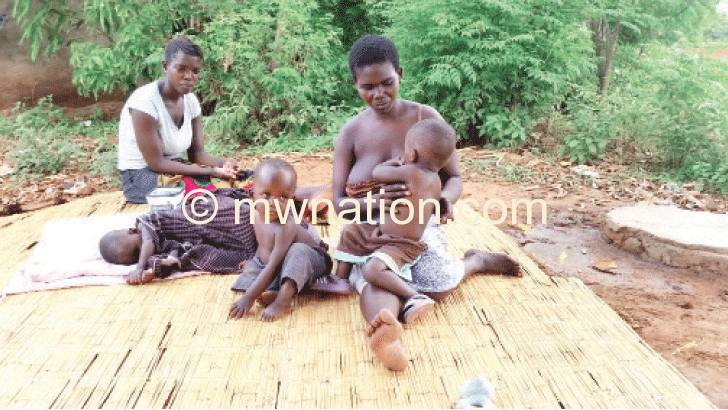When beneficiaries starve amid relief food
Following the January 2015 floods and subsequent drought, over two million families are subjected to serious hunger. Government’s food distribution initiative brought hope, but is it enough? ALBERT SHARRA writes.
Chifundo Gama, 32, of Dambo Village, Traditional Authority (T/A) Kunthembwe in Blantyre rural says this year’s hunger has made her regret having three children.

“I feel guilty to see my children starving,” says Gama.
This year’s hunger has hit her household hard. She says her family sometimes goes without a meal for as many as three days.
Sitting under a tree with her children, Gama, who has a five-year-old child and twins that are still breastfeeding, looks helpless. The pain of hunger is written on her face.
“I am helpless and don’t know if my children will survive,” she narrates: “The last time I took a proper meal is two weeks ago. The babies are not getting enough nutrients from breastfeeding because I am not eating well.”
Gama, a widow, depends on farming for survival, but unlike previous years when her farm would give her 10 bags of maize, last year’s harvest failed to produce even one 50 kilogramme (kg) bag.
“I now have to depend on piecework. Sometimes I sell charcoal. I buy a bag at K1 000 (about $1.4) to sell at a profit, but it takes a whole week to sell one bag and since I survive on hand-to-mouth, the profit is hardly seen,” explains Gama.
She is just an example of millions of Malawians starving in the wake of last year’s drought and floods.
President Peter Mutharika announced in September 2015 that 2.8 million Malawians are facing hunger. World Food Programme (WFP) is reaching out to 2.4 million food insecure population, with 70 percent of them getting food assistance and the remainder receiving cash.
Gama is among the 2.4 million relief aid beneficiaries.
The Nation has established that so far, beneficiaries in Blantyre, Chikwawa and Dedza have received the food items or cash twice.
According to WFP food distribution programme, each household is supposed to get a 50kg bag of maize, 6kg of legumes and two litres of cooking oil.
However, in Group Village Head (GVH) Magombo and Village Head Dambo in T/A Kunthembwe, the package is being shared among two or four households.
Magombo says people in her area prefer receiving food items to cash.
“Each area is allocated a specific amount of food items and my area has four villages—Dambo, Masitala, Magombo and Chibowa. We are geting items for 179. Depending on the size of the family, some food items are shared among two, three or four households,” explains Magombo.
In Dedza, T/A Kachindamoto says the registered population for the programme is a small fraction of the needy population.
“I can inform you that we have lost two children to hunger already this January after they ate rotten mangoes in the absence of their parents. We do not want some to starve when others have plenty,” she says.
In Chikwawa, Paramount Chief Lundu says many people are starving because the number of beneficiaries is too small compared to those that need support.
However, he could not accept or deny speculations that registered beneficiaries are sharing with unregistered ones.
“I do not agree with cash arrangement because maize prices are fluctuating all the time. For the two times the aid has been disbursed, most families got K16 400 on average, but due to poverty, many do not use the whole sum and the result is that they starve before another consignment comes,” says the chief, adding the cash each family gets is determined by food prices on the market.
Gama says the sharing system has watered down the impact of the programme. She says a complete package can support them for 30 days, but the portion she has been getting barely lasts a fortnight.
“We are starving and I worry that my children will suffer from malnutrition,” she explains.
Davie Magaleta of Kunthembwe Village, T/A Kunthembwe reveals that for two times, he has shared his items with three other households. Thus, he got 12kg of maize, 1.2 kg of pigeon peas and a quarter litre of cooking oil. He is married with five children and says the items only last for a week.
“It will be a lie to say I feel the impact of the relief items, but it is better than nothing,” says Magaleta.
Food distribution coordinator for Blantyre, Brian Batala, insists that the relief package is meant for one household.
“It is the chiefs’ idea to share them among more households. With the hunger situation, this is not surprising, but it is happening without our knowledge,” explains Batala.
Minister of Agriculture, Irrigation and Water Development Allan Chiyembekeza expressed shock at the revelations, saying he had a meeting with WFP recently, but he was not briefed on this.
“It is a problem with our chiefs. They disregard government’s direction and do what they want. This is wrong. The same is happening with Farm Input Subsidy Programme, they are sharing the two bags which a household was supposed to get.
“In the end, it will affect the harvest. With the relief food programme, when they share the package which could last for a month, it only lasts a week or two,” says Chiyembekeza, adding it is a serious problem that should be addressed and promised to take an immediate action.n





